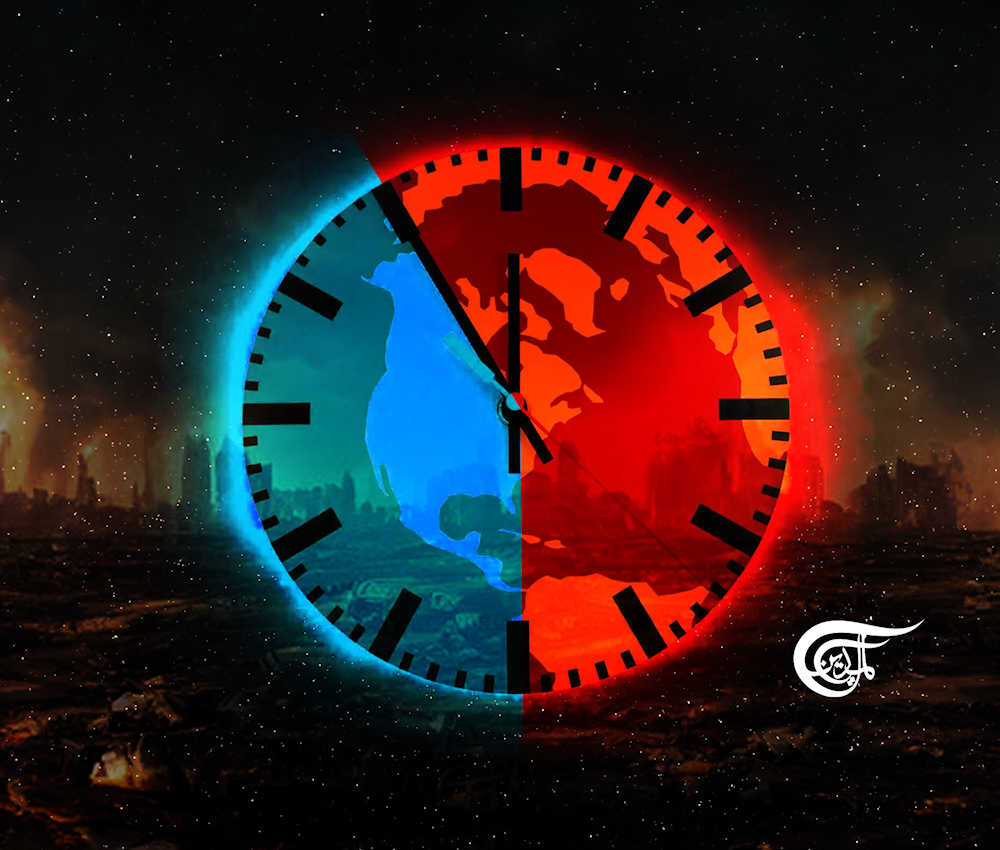The Fabric of Reality
Soon we become a people without memory of its past; a space ghosting shapes long broken or forgotten.
-

The Fabric of Reality
The celebrated French philosopher, Henri Corbin, who taught at Tehran University, once drew the attention of a Western friend to an ancient cupboard in a Tehran café, in which they were sitting. The old piece had several shelves -- each enclosed by thin panelling -- cut around the outline of different vases and urns, into which they would be slotted on the shelves.
Only, as Corbin noted, the vases and urns were absent: they had long since vanished; broken or lost.
The point Corbin was making was that nonetheless the space which once they physically occupied still persisted in clear outline. And so it is with ideas, with things said or written. They are not entirely gone. The space persists and somehow relentlessly reminds us of them.
Corbin here was pointing at something important about Shi’a understanding of time and memory. He was hinting that memory resides not just in ourselves, but beyond the confine of individual brains; and that memories can and do surge up into consciousness, triggering a recall of something past.
Corbin was a close friend of Carl Jung (they together attended the annual Eranos conferences), and Corbin’s insights drawn from long study of Shi’a philosophy were, as Jung acknowledged, to influence his own work on the collective (transpersonal) unconsciousness.
It is a significant point: Ideas, conceptualisations and history may be shut down and cancelled by the command of the ‘masters of dogma’, but the space these intellectual vessels once occupied is still ethereally there -- to rise again in challenge to dogma.
The massive polarization occurring today in the world is not simply geopolitical. It is not simply a competition over resources, or even simply a rivalry based on trade relationships. The conflict between Western élites and the rest of humanity, as Emmanuel Todd has suggested in La Défaite, is the result of the West “falling into nihilism and the deification of nothing”. Todd defined this nihilism as “the desire for destruction, but also of the negation of reality. There are no longer any traces of religion, but the human being is still there.”
We are in for an extended period of revolution and of civil war. Ukraine and Gaza already have brought about the West’s ideological self-isolation in the world. The world is not in the least invested in the notion that Ukraine and Washington somehow represent ‘freedom and progress’, and Moscow ‘stands for tyranny’.
The Washington-led West simply has no clue as to how much of the world rejects the value system of contemporary globalist neo-liberalism.
The Ruling Strata, however, views giving up power as the height of irresponsibility. As betrayal, even! A mindset reflecting a breath-taking dogmatism; a kind of ideological solipsism, preventing these technocratic élites from seeing the world as it actually is.
Holding onto power trumps upholding the old Order that brought them to power (or maintaining a Constitution, or respecting the Law).
The masses -- absent essential élite guidance -- our rulers believe, risk being captured by the dark forces of ‘Populism’ and authoritarianism.
The disorder of their slide towards ‘otherness’ threatens to disorder the new world of values - and makes them enemy to the new diversity of identity, now sacralised to the point of being non-negotiable.
Diversity paradoxically inverts not at all to legitimize wider horizons, but rather, towards a new dogmatism: Rival minorities are ‘gated’ behind an array of dogma and impervious to rational discussion.
The physical segregation of the population to self-enclosed, heterogenous identity enclaves has its counterpart in the balkanization of opinion. Each compartment is barricaded behind its own dogmas, emoting and shouting at each other; yet unable to settle any dispute.
Therefore, all tools -- Money, Institutions and Media -- must be put to the enforcement of the New Order.
The Ancient understanding of society and history -- of the world -- was that of an integrated totality. It offered a more holistic perspective -- one which can account for, rather than annul or strike out, the contradictions within the fabric of reality.
Contradictions and oppositions within history and understanding today are regarded as dangerous and signs of a threat to democratic order.
The underlying reality, however, is that individual life stories of members of a community become enmeshed and intertwined. And the entanglement of our stories surges out to form the everyday weft and weave of communal life.
The latter can and should never become funnelled into a single ‘way of thinking’ -- generated abstractly and imposed by Central Command.
Defending historical holism, however, implies ultimately, the defence of unique existence, in spite of any superficial contradictions within.
To defend the existence of your people, their unique culture and way of life as an organic, integral, and holistic culmination of the people's historical existence, in itself is History viewed as a living organic thing.
The tool of ‘free money’ facilitated enforcement of many things, but particularly has achieved a hold over the media.
The rush ‘free money’ at zero interest, called Quantitative Monetary Easing or QE - was launched in Japan in 2001. The total credit created by central banks through quantitative easing, or QE, is now more than $30 trillion.
QE quietly became the defining idea of our time. And as QE drove inequality, it polarised politics.
For the past 15 years, every major development in the Western economy and the cultural superstructure has rested upon it: the explosive growth of social media and Big Tech, the property boom, the gig economy, Elon Musk, cryptocurrencies, fake news and woke capitalism.
Trillions flooded into the financial system. It was magic to the financialised world, but it had another effect too --
The rush of ‘free money’ gave Big Tech the power to buy up platforms that previously had relied on selling the news. They were replaced by entities beholden to advertisers that only cared about grabbing people’s attention and selling it to the highest bidder.
A new economy of attention arose -- a machine for turning distraction and polarisation into investor returns.
The Power Structures ‘got it’: Words no longer need to have objective meanings in this market. Everything is about ‘attention’, however achieved. True or false. That’s what the advertisers wanted. Words could mean what those in power say they mean. The ‘truth’ behind the narrative became irrelevant.
What mattered was the force of a narrative, now divorced from meaning, to compel a singularity of messaging, and to demand that belief in the new order be reflected, not just in compliance, but in assimilation of the messaging into personal conduct in life. Critical thinking was disallowed as denoting an enemy; a threat to be crushed.
This revolution and civil war are likely to be extended over time. Enforcement will predominate initially, but ultimately the Ruling Strata will overreach itself. Emmanuel Todd has defined the West as a “post-imperial” entity; just a shell of military machinery deprived of an intelligence-driven culture, leading to “accentuated military expansion in a phase of massive contraction of its industrial base”. As Todd stresses, “modern war without industry is an oxymoron”.
Each time that society just says ‘No’, enforcement by the Ruling Strata will become more problematic, more stupidly heavy-handed. And the Élites will duly undercut themselves.
Julian Assange is a soldier seized by enemy forces -- an undeserving victim in this ‘war’. I mourn also Daryia Dugina who was burnt to death in a fireball, as her father watched on, helplessly -- another battlefront to this war. I salute them both. Let us continue saying, ‘No’; ‘Just go’.
This article is based on a talk given by Alastair Crooke on 9 March 2024 as part of the conference Night Falls in the Evening Lands: The Assange Epic, organised by the Julian Assange Campaign.

 Alastair Crooke
Alastair Crooke
 8 Min Read
8 Min Read











